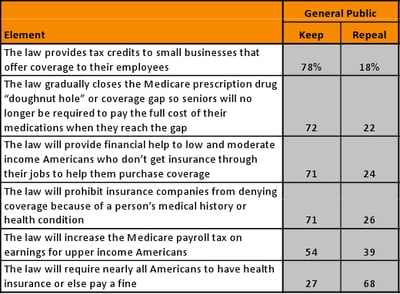GOP Wages War on 59 Million Uninsured
Emboldened by their midterm victories, the GOP and its amen corner have stepped up their war against the Affordable Care Act. Yesterday, Senate Minority Leader Mitch McConnell promised to file a friend-of-the-court brief in the multistate lawsuit challenging its constitutionality. In Texas, Republicans are threatening to withdraw from Medicaid, a move which would swell the ranks of the Lone Star State's uninsured to a stunning 40%. Meanwhile, Rush Limbaugh added a new attack on the health care reform law, declaring that pre-existing condition coverage "is not insurance, it's welfare."
Sadly for GOP's "repeal and replace" campaign, two developments this week will make the Republican rollback effort even harder. Even as a new Kaiser poll confirmed the overwhelming popularity of most of the ACA's provisions, the CDC announced the ranks of the uninsured had swollen to 59 million.
Just two months after the U.S. Census Bureau reported that 50.7 million people lacked health insurance in 2009, the U.S. Centers for Disease Control and Prevention announced "nearly 59 million Americans went without health insurance coverage for at least part of 2010, many of them with conditions or diseases that needed treatment." It was only the Democratic expansion of the State Children's Health Insurance Program (S-CHIP) which offset in part the continued decline in employer provided coverage.
The CDC in-person survey of 90,000 individuals didn't just highlight the recession's impact in adding three million more Americans to those who had no health insurance for at least part of the year. As CDC's Thomas Frieden put it, "Now, the data also allow us to debunk two myths about health care coverage."
"The first myth is that it's only the poor who are uninsured. In fact, half of the uninsured are over the poverty level and one in three adults under 65 in the middle income range -- defined arbitrarily here between $44,000 and $65,000 a year for a family of four -- were uninsured at some point in the year."
And Frieden said many people argue that only the healthy risk going without health insurance.
"In fact ... more than two out of five individuals who are uninsured at some point during the past year had one or more chronic diseases and this is based on just a partial list of chronic diseases," he said.
Among them, it turns out, are 15 million of the people who went without health insurance despite having high blood pressure, diabetes or asthma.
The grim findings from the CDC are just the latest to show the devastating impact of the economic downturn which began in December 2007. Even among those with insurance, Americans are self-rationing; that is, dramatically cutting back on routine health care. As an August study by the National Bureau of Economic Research (the same group which officially declares the beginning and end of U.S. recessions) found:
Among Americans responding to the survey, they said, 26.5 percent reported reducing their use of routine medical care since the start of the global economic crisis in 2007.
The authors concluded, "We find strong evidence that the economic crisis -- manifested in job and wealth losses -- has led to reductions in the use of routine medical care." That finding not only echoes data from the American Hospital Association, which in June reported that "About 70 percent of hospitals report fewer patient visits and elective procedures as family budgets remain tight and patients continue to delay or forgo care." The NBER study suggests that the uniquely American phenomenon of health care self-rationing is getting worse.
As McClatchy reported in October 2009, a new Consumers Union survey revealed that due to skyrocketing costs and reductions in coverage, Americans are forced to deny themselves needed medical treatment. Among the findings of CU's poll of a 1,002 respondents:
In the new poll 59 percent said that the cost of their health care had increased more than their other expenses over the past two years. Fifty-one percent said they had faced difficult health care choices in the past year. The most common responses were putting off a doctor visit because of cost (28 percent), not being unable to afford medical bills or medication (25 percent), and putting off a medical procedure because of cost (22 percent).
All of which explains the high levels of public support for the patient protections in the health care bill of rights enshrined in the Affordable Care Act. As Ezra Klein explained the latest Kaiser survey in the Washington Post:
As other polls have shown, there's certainly appetite for a partial repeal, if not a full repeal.
But then you start asking about repealing specific provisions and, well, things become less popular in a hurry. Everything from the subsidies to the increase in the Medicare tax is popular. The individual mandate isn't, and you might see the GOP focus on that, but tweaking the penalty there is a far cry from full repeal. Eventually, the GOP is going to stop being on the side of health-care repeal and find themselves on the side of allowing insurers to discriminate against the sick and seniors to fall into the doughnut hole.
Ultimately, former Bush speechwriter David Frum predicts, the GOP will blink, forcing Republicans to "fall back upon a Plan B, basically a series of stunts":
They'll schedule a vote to repeal the "cuts" in Medicare under health care reform. (Not really cuts -- restrictions on future growth.)
They'll refuse to appropriate funds to implement aspects of health care reform.
They'll call hearings to publicize problems with the law and complaints from those negatively affected.
And at the end of two years, the law will still be there, more or less intact.
For now, at least, Mitch McConnell is undeterred by the realities of either parliamentary process or public opinion. Republicans, McConnell insisted Sunday, "owe it to the American people" to try to repeal health care reform.
(For more background, see: "The 10 Republican No's on Health Care.")


